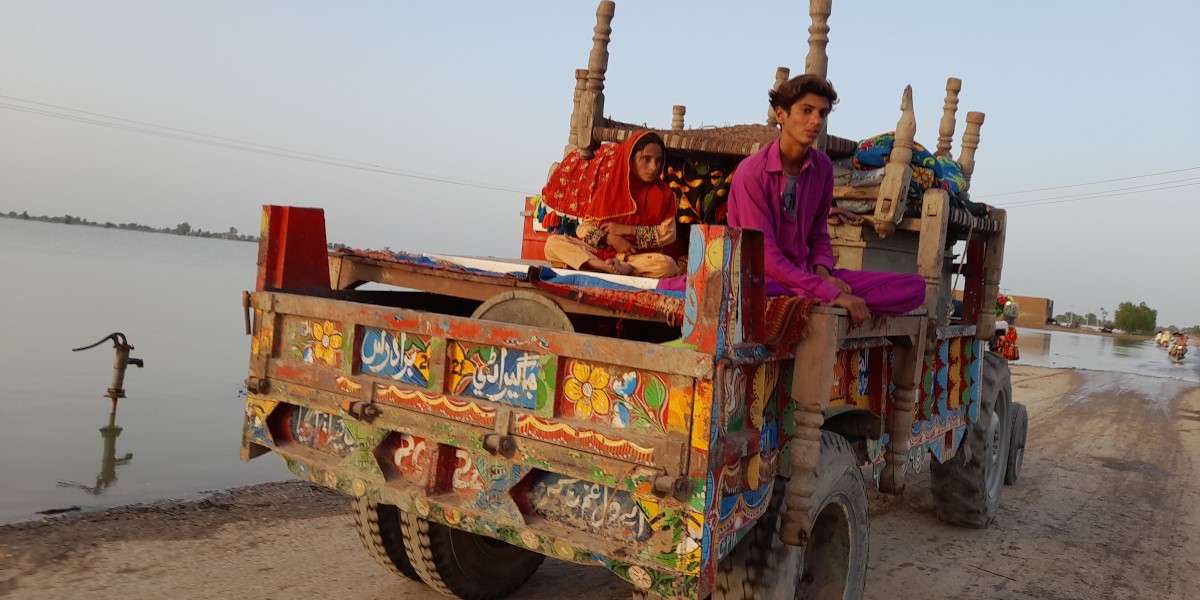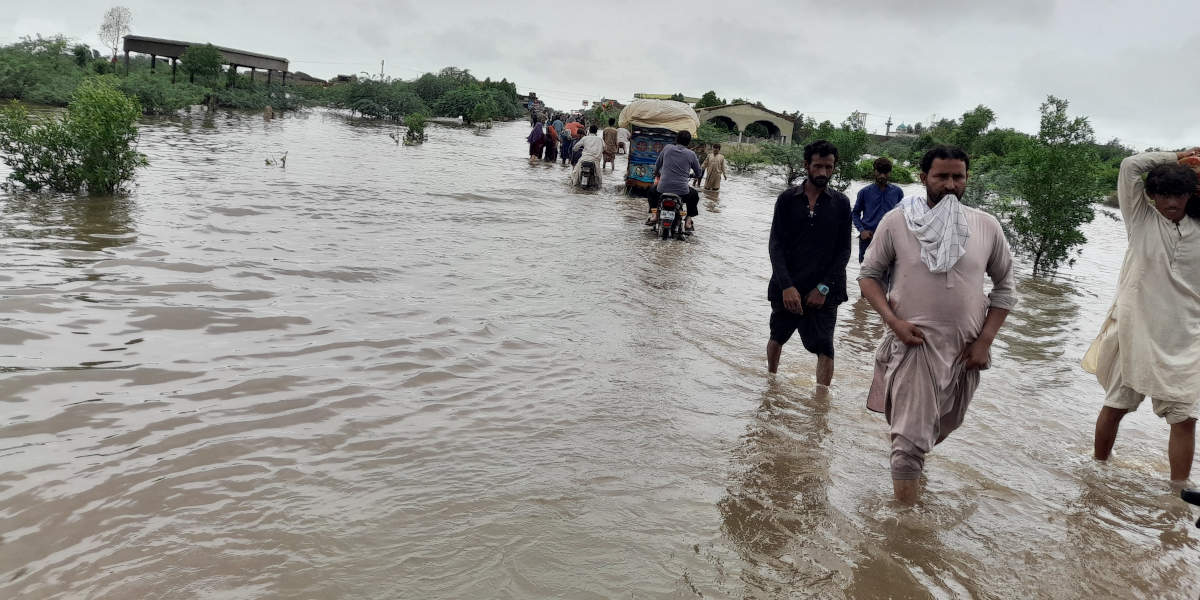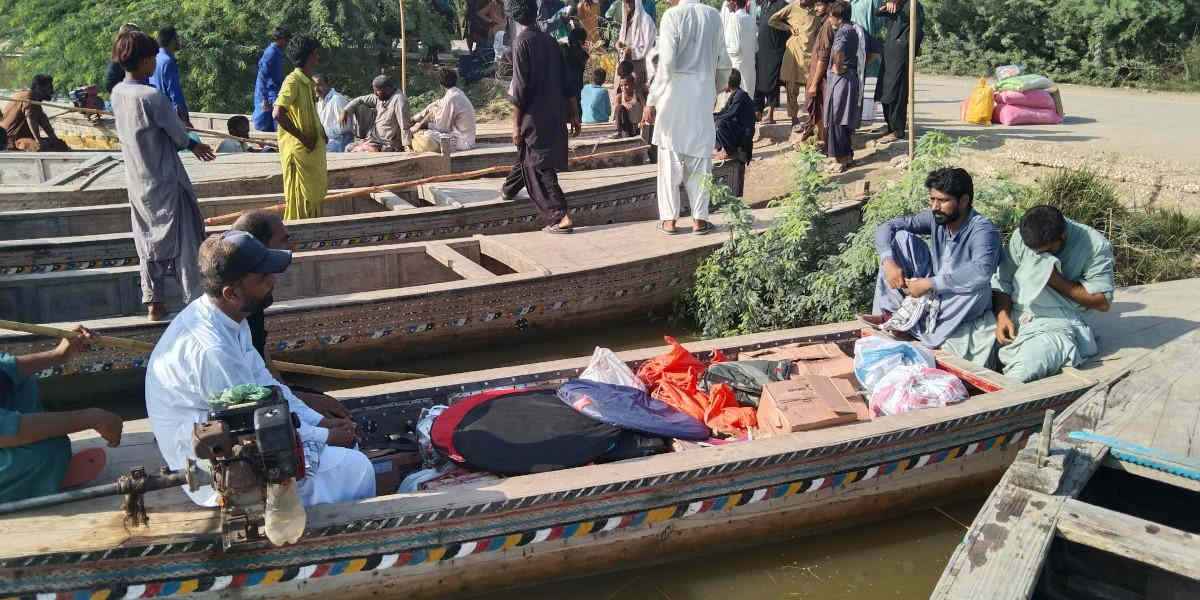Thirty-three million people have been affected by the floods in Pakistan. The disaster has left more than 1,700 dead, displaced millions and put one-third of the country under water. As we go to press, the water has still not receded in many areas. We reached out to three activists from left-wing parties, representing women, students, peasants, workers and others, for their responses to and readings of the floods.
Jai Kumar – Progressive Students Federation (PrSF), Sindh chapter
We knew a crisis was coming
When the rain was falling heavily from the skies we knew, from experience, a crisis was coming, that villages were going to be submerged. We knew, from the 2010 floods, for the sake of their landholdings, they, the landholders, would drown entire cities, entire villages, by rerouting water and/or not letting the flood water touch their land… This time they also wanted to save the China Pakistan Economic Corridor (CPEC) road. For a tiny piece of concrete, they let entire villages drown.
This was not an ‘equal’ disaster. Not everyone was impacted in the same way
There were predictions, two months ahead of time, that heavy rains were on the way to South Asia. There was time to put plans in place. But it was only after the rains came, once cities were drowned that officials offered some relief – one or two measly ships to evacuate people. Neither the federal or local government had any idea of how to drain the floodwater. It was only after the water levels rose, once villages were drowned, once people were drowned, they started to think of how to drain the floodwater.
Activist networks coming good
When we started to respond to the floods… the misery [we] saw… millions were displaced. We were in awe. Despair. How would these people be rehabilitated, we asked ourselves? We already had networks, activists, and party workers on the ground doing pre-existing work. When the floods came, we were able to respond and organise quickly. We rescued people, evacuated homes, and immediately set up relief and medical camps – we were the first to do so. We’ve been distributing rations, clothes, materials for shelter, cooking, and medicines.
Water-related disease
There were some 40 to 45 of us workers from PrSF. All of us got sick: dengue, malaria, fever. There was 20 feet of standing water in front of us, it was inevitable. Despite this, we worked day and night… what we saw made us forget ourselves, our worries. So many people were affected. It was so hard. We tried our best. But imagine, you turn up to a place with the amount of goods to help 300 people but 1,500 people need support? How could we give everyone the relief they needed?
An unequal disaster
This was not an ‘equal’ disaster. Not everyone was impacted in the same way. We saw, first-hand, the effects of climate change and class working hand-in-hand to produce inequalities in times of catastrophe. As soon as the water started to enter the city or towns, the elite, the middle classes, they got out straight away. But the poor?
Most people didn’t have the money to pay for basic transport to get themselves out of danger and move to a safer town. Instead, people walked on foot for 100 miles, 200 miles, 300 miles, to get to Hyderabad, or other bigger cities. They’d turn up to our relief camps, their feet swollen, covered in blisters. They lost everything: their livelihoods, their homes, their lands… everything.
Officials set up temporary shelters in government schools and colleges, but after three weeks told people to leave. The water is still in their villages! Where can they go? People are out, on the street, in makeshift tents. The same thing happened in 2010. So people are stuck.
It took capitalism and imperialism just 300 years to ruin the earth. Now, as climate change is upon us, the elite, the one percent will try to save itself and ruin the rest of us. There needs to be a movement, an international solidarity to make change.
Tooba Syed – Women’s Democratic Front and Awami Workers’ Party, Punjab chapter
Toilets, menstrual hygiene and health
Most women affected by the floods use reusable clothes during the menstrual cycle, but there’s no clean water, because parts of Sindh are still six feet underwater.
Relief camps for displaced persons might have 500 living in a camp, but only one or two functioning toilets. Many women prefer not to use those toilets, so they hold it in for long hours and wait until night to go and use the toilet somewhere outside, in the open.
Tens of thousands of women have been and are giving birth at a time of disaster and displacement. But there are no birthing places for them and no medical support.
We don’t need technical solutions. We need sustainable, indigenous solutions, new knowledge making practices, and we need new people to lead the way
Our healthcare systems are not working at the best of times, and we cannot expect that suddenly, during a disaster, these systems are going to be operational. We feel this shortage now because what we urgently need are mass medical camps, birthing spaces… but they’re just not there.
We’re also in the midst of mass epidemics of malaria and dengue right now. Other than that, because of not having access to clean drinking water, there’s diarrhoea, there’s cholera, there’s skin disease…
Collective action
In Islamabad, when we started working, there weren’t a lot of us. On the first day we held a fundraising camp, it was just three of us. Then a lot of young people, women and men, just started volunteering. Despite the dangers of relief work, they wanted to go to the flood affected areas or help in some way. In many areas the roads weren’t functioning because the water was so high, communications lines weren’t working, and you had to walk for two or three hours to offer relief – and people did.

In many areas, flood waters have yet to recede, and when they do they leave a deeply scarred landscape
CREDIT: IBRAHIM BURRIRO
There have been so many solidarity actions, even from folks internationally, I don’t remember all of them. A women’s collective cafe in Sialkot donated three days’ income to us. German dancers donated to us. Women we know from the Kurdish women’s movement, Iranian women activists have donated to us… Honestly, this was one of the only things that was motivating us to do this, because it has been a really dark time for us. Solidarity has kept us going.
Imperial river management
If you look at the countries which are affected by the climate crisis right now, they’re mostly countries that have all been colonised in the past. A lot of interventions in the colonial era have led to a certain type of imperial river management, which contributes to flooding today.
In Pakistan, British imperialists built canals, justifying their actions as ‘famine prevention’. But the canals were more about finding avenues to invest capital from London and revenue generation. They made canals mostly in areas that were already fertile lands, where agriculture was already happening. This meant that areas that were already irrigated had extra water. Ultimately, they changed the nature of the Indus.
More recently, the World Bank’s interventions have had grave implications. They’ve engaged in botched schemes, such as in Badin, Sindh, to try to control the river and its flow. The people of these areas protested, including with a people’s tribunal. But nobody listened. Much later, a World Bank investigation team came along and said, ‘Oops, we made a mistake.’ But their mistake displaced entire communities, including many indigenous river communities.
The Pakistani government
The floods are, yes, you could say, the fault of our incompetent government. But even when these floods were happening, the Pakistani state was struggling to secure a loan from the IMF. And the loan doesn’t give us the sovereignty to decide where we spend the money. Pakistan operates in a debt economy that is completely governed by international financial institutions. There are several river-related projects funded by the World Bank where it has its own technical team doing the work, even when people who live near the riverbeds know the water better.
There was a lack of preparedness on the side of the government, yes. But how much can a country prepare itself in the absence of funds or a lack of sovereignty? I’m fine with holding the government accountable, but that’s our job, within Pakistan. And maybe when we’re holding our government accountable the World Bank should listen to us? Because we’re telling them, don’t do this, there will be destruction. They do not listen to us. It’s their funded – and poorly planned – dams that are causing the floods.
Displaced people have no choice but to walk through flood water, exposing themselves to infection, in search of dry ground and aid supplies
CREDIT: IBRAHIM BURIRO

Solutions
The scale of this crisis necessitates action across the global north and south. We need to revive the internationalist spirit in international politics. We need to build people to people solidarity.
Many of the countries that are impacted by climate change are in debt. Debt cancellation is critical. Organisations such as the World Bank, the Asian Development Bank and African Development Bank need to be actively pushed back against – as well as the IMF.
There needs to be internationalist politics around rivers. As long as we treat our resources as things that need to be bought into the realms of production or for commodification, we’re in trouble. The same applies if we only see rivers as conduits of water. We are a part of this natural ecosystem, we are not outside of it.
As long as we try to dominate nature, not much will change. This is what we still see – global institutions are pushing for technical solutions. But we don’t need technical solutions. We need sustainable solutions, we need indigenous solutions, new knowledge making practices, and we need new people to lead the way.
Bakhshal Thalo – Awami Workers’ Party, Sindh chapter
Responding to the floods
The devastation is massive. In Sindh alone 10 million people are displaced. The first thing we had to do was emergency evacuations: literally saving people from drowning. Then food distribution. Now it’s like we’re operating in an epidemic. Malaria, dengue, other waterborne diseases, gastrological issues: there’s disease everywhere. We’re running close to 50 medical camps. Even before the floods, at least 70 per cent of Sindh’s population was suffering from malnutrition… This is what the floods do: they bring to the surface those hidden elements of our society’s hunger.
The climate question has to be linked to the question of class, the question of gender, and to us here in the global south
We’ve used our party’s networks to organise ourselves and linked with other activists and political organisations to coordinate relief. But how much can we do in the face of such a massive disaster? We’ve tried, but we haven’t made a dent. What can you do when people are suffering in their tens of thousands?
The power of the Indus river
Normally, we say, floods are a blessing for Sindh (the Indus). Floods are a part of a river’s life. Rivers are alive: the river breathes, sometimes it dries up, sometimes it overflows, sometimes it takes a turn, in ways unexpected.
One thing we say is the river has made Sindh, not Sindh (and its people) that have made the river. We need to learn to live with the river, its temperament. But we’re not doing this. We haven’t been doing this since the colonialists introduced mass engineering projects that sought to control the river, to conquer it. But the river hasn’t been conquered and all we’re left with is devastation.
Global inequalities
Europe is also facing the effects of climate change: droughts, extreme temperature, hurricanes. But because they have the whole world’s loot at their feet, they have solutions out of this devastation, new technologies, etc. It’s us from the third world, Asia, Africa, Latin America, who will always suffer the greatest—and right now South Asia is suffering the most… We are seen as expendable, surplus populations.
They’re stopping fossil fuel in their own countries but increasing fossil fuel in our countries. China is reducing carbon emissions in its own country but giving Pakistan the technology to manage new plants. Tharcoal’s – a coal plant in Sindh – just had its second phase opened by the prime minister, Shahbaz Sharif. They claim the plant is an ‘energy basket’, but they know it will be a disaster for all of us living in the area.
The fight is international
Climate change is a global fight. The climate question has to be linked to the question of class, the question of gender, and to us here in the global south. Only when we link our issues can we find a solution. And climate change cannot be resolved today, which is still an imperial age, unless we account for uneven socio-economic age, uneven development, global inequalities. The corporate sector won’t help us, those in power won’t help. We need to stand together as internationalists, arm-in-arm with each other. This will only be resolved by global action. Animals are becoming extinct. Plastics are consuming the sea. We need a new strategy, new tactics. It is our job. We have to fight.










